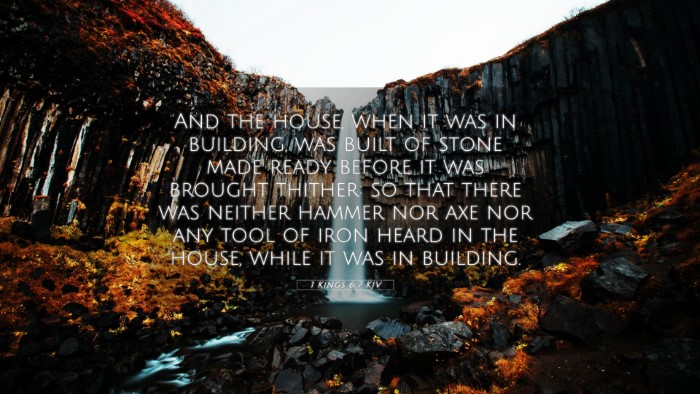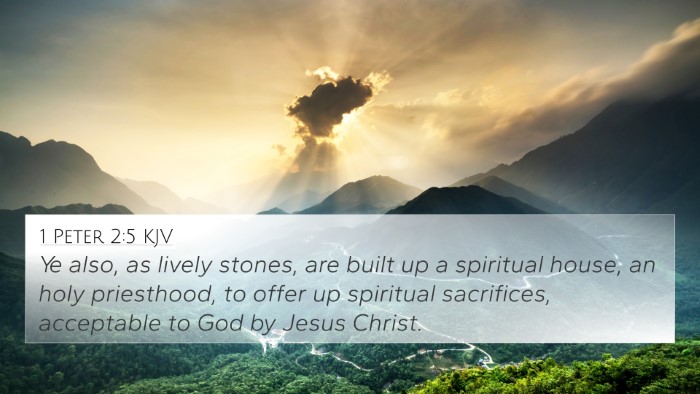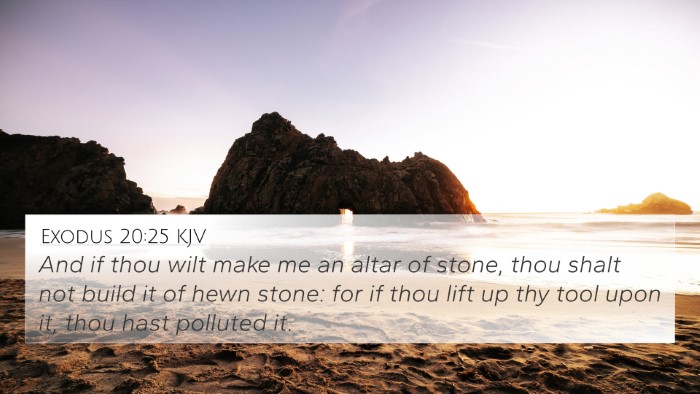Understanding 1 Kings 6:7
This passage provides profound insights into the construction of Solomon's temple, focusing on architectural details that reveal significant theological implications.
Verse Context
1 Kings 6:7 states: “And the house, when it was in building, was built of stone made ready before it was brought thither: so that there was neither hammer nor axe nor any tool of iron heard in the house, while it was in building.”
This verse illustrates a divine blueprint for constructing the temple, emphasizing both the grandeur of the structure and the sacredness of the process.
Commentary Insights
-
Matthew Henry:
Henry notes that the silence during construction symbolizes the peace and order in which God's house should arise. The preparation of stones suggests that God desires believers to be prepared and fit for service before being brought into his temple.
-
Albert Barnes:
Barnes highlights the absence of noise from tools as significant, implying that God's work is often done in a quiet, serene manner. This reflects the holiness of the place, where the presence of God is fully honored and revered.
-
Adam Clarke:
Clarke elaborates on the term "made ready," indicating that the materials were pre-fitted. This reflects the careful and intentional planning that God has for His people, suggesting divine orchestration behind every detail of temple construction.
Theological Implications
This verse speaks to the sanctity of God's dwelling among His people. The silent construction signifies a work of God that does not require human strife or clamor:
-
Divine Presence:
The absence of construction noise serves as a metaphor for the tranquility and holiness expected when engaging with the divine.
-
Preparation:
The pre-prepared stones symbolize the need for believers to be spiritually equipped before entering into significant endeavors for God.
Cross-References
In understanding 1 Kings 6:7, several Bible verses resonate closely with its themes, offering a deeper comprehension:
- Exodus 20:24 - Discusses building altars in a manner pleasing to God, emphasizing spiritual integrity in physical constructions.
- Psalm 127:1 - "Unless the Lord builds the house, the builders labor in vain," stressing the importance of divine involvement in any project.
- Isaiah 28:16 - Portrays Christ as the cornerstone, further illustrating the significance of having a solid foundation in faith.
- Hebrews 3:4 - Identifies God as the ultimate builder of all things, reinforcing the notion of divine craftsmanship.
- Acts 7:47-50 - References the tabernacle and the importance of sacred spaces where God resides among His people.
- Matthew 21:13 - Jesus refers to the temple as a "house of prayer," underscoring its purpose as a holy meeting place with God.
- Ephesians 2:19-22 - Describes believers as being built together for a dwelling place of God, linking the temple narrative to the church.
Practical Applications
Understanding 1 Kings 6:7 leads to several practical applications in the life of a believer:
- Preparation for Service: Individuals should strive to be spiritually prepared and equipped, just as the stones were made ready for the temple.
- Emphasizing Reverence in Worship: Recognizing the importance of quietness and focus in worship settings reflects a heart posture of honoring God.
- Seeking Divine Guidance: Relying on God's wisdom and planning in one's life endeavors reflects the overarching theme of God as the master builder.
Conclusion
1 Kings 6:7 provides rich theological and practical insights about the nature of God's dwelling place and the preparation needed for sacred work. The messages contained in this verse encourage believers to engage in careful reflection, preparation, and reverence towards God's presence in their lives.
For deeper study on the interconnectedness of scripture, various tools for Bible cross-referencing can enhance your understanding and uncover connections between Bible verses that enrich your spiritual knowledge.














